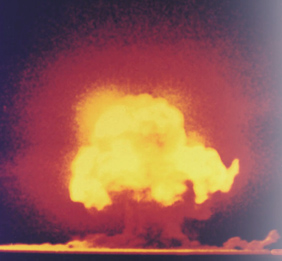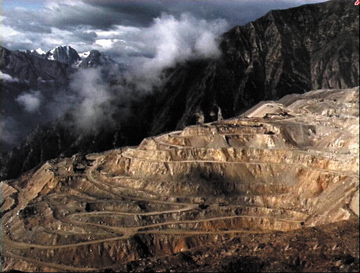
Geotimes Home | AGI Home | Information Services | Geoscience Education | Public Policy | Programs | Publications | Careers

 That all changed in
the fall of 1996 when the United Nations adopted a new treaty to ban the testing
of nuclear weapons worldwide. Although President Clinton was the first head of
state to sign the Comprehensive Nuclear Test Ban Treaty (CTBT), the U.S. Senate
voted against its ratification in October 1999. One of the key concerns raised
by opponents of the treaty was the ability to monitor testing and thus ensure
that all countries are playing by the same rules — concerns shared by the
current Bush administration. They argued that the United States would be unable
to detect clandestine nuclear testing by other countries, thus putting the country
at risk.
That all changed in
the fall of 1996 when the United Nations adopted a new treaty to ban the testing
of nuclear weapons worldwide. Although President Clinton was the first head of
state to sign the Comprehensive Nuclear Test Ban Treaty (CTBT), the U.S. Senate
voted against its ratification in October 1999. One of the key concerns raised
by opponents of the treaty was the ability to monitor testing and thus ensure
that all countries are playing by the same rules — concerns shared by the
current Bush administration. They argued that the United States would be unable
to detect clandestine nuclear testing by other countries, thus putting the country
at risk.  Distinguishing a natural
seismic signal from a mine blast or a nuclear explosion is fairly easy if the
signal is large enough (Geotimes, August 2000). The signals vary in their
frequency content. With smaller signals, frequency analysis is increasingly difficult.
Mine blasting can result in seismic events smaller than magnitude 4.0 that superficially
appear similar to nuclear explosions. Other, larger signals sometimes also produce
initially confusing signals. The NAS report states that IMS can effectively identify
trickier signals by looking at a combination of signals, such as an infrasound
signal coupled with a seismic one.
Distinguishing a natural
seismic signal from a mine blast or a nuclear explosion is fairly easy if the
signal is large enough (Geotimes, August 2000). The signals vary in their
frequency content. With smaller signals, frequency analysis is increasingly difficult.
Mine blasting can result in seismic events smaller than magnitude 4.0 that superficially
appear similar to nuclear explosions. Other, larger signals sometimes also produce
initially confusing signals. The NAS report states that IMS can effectively identify
trickier signals by looking at a combination of signals, such as an infrasound
signal coupled with a seismic one. | Data
Sharing and the CTBT Every now and then, a seismic signal garners the attention of seismologists worldwide. While outside researchers sometimes contribute their analyses of these "problem events" ad hoc to the IMS, they work with separate stations. The sharing of data between IMS and independent researchers is a hot topic of controversy in the CTBT. The Vienna-based IDC began as a prototype in 1996, operating near Washington, D.C., for five years {emdash} a test bed to demonstrate that countries could monitor a test-ban treaty, explains Ray Willemann, director of the International Seismological Centre in the United Kingdom. The prototype IDC made the Reviewed Event Bulletin openly available to the research community. Since its move to Vienna, the IDC has given the list to only National Data Centers and select users, says Willemann, who worked at the prototype IDC. Under the CTBT, participating countries must reach a consensus on all decisions, including the issue of data sharing, a task that has proved particularly difficult. The IMS collects several types of data, including hydroacoustic, infrared and radionuclide, in addition to seismic. Many countries, Willemann explains, have difficulty separating the data when it comes to making decisions about data sharing. Because CTBT countries are not treating the seismic data separately from the rest of the IMS data, countries that object to making the data openly available are largely concerned about releasing sensitive, largely non-seismic data, such as radionuclide signals, to the public. Willemann and Richards, like most seismologists, believe that the seismic data should be freely available. Indeed, the NAS report states that a multiplicity of users would greatly enhance the quality of IDC operations. "This is a complicated system, acquiring data of considerable scientific importance. The best way to keep it operating really well is to have users who will occasionally point out if something doesn't appear quite right. There's nothing like having a community of users to keep you awake," Richards says. Lisa M. Pinsker |
 |
Geotimes Home | AGI Home | Information Services | Geoscience Education | Public Policy | Programs | Publications | Careers |